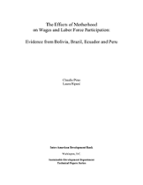The Effects of Motherhood on Wages and Labor Force Participation: Evidence from Bolivia, Brazil, Ecuador and Peru
Date
Nov 2005
This study asks a simple question that has significant implications for gender equality. After decades of increasing female participation in the labor market, advances in the labor legislation and persistent gender wage gaps, what are the effects of motherhood on labor force participation and wages in Latin America? The data presented in this report show that mothers with children under 7 years of age participate less in the labor market than those with no children, except for single mothers. Another interesting result is that female labor force participation generally increases with age and decreases with family responsibilities. In contrast to the evidence found in the United States, United Kingdom, Australia and Germany, where mothers earn lower wages than women with no children, the results for Latin America do not show a homogeneous impact of motherhood on wages. While in Peru there exists a penalty for mothers of children under 7, in Bolivia and Brazil there is a premium for being a mother. Ecuador shows no significant effects. This heterogeneity is further investigated by considering public and private sectors, educational levels and age groups. The study finds that wage penalties and premiums are not borne equally among all mothers.



